Rhea Landholm contributed to this blog.
When asked why she supports the Center for Rural Affairs, Barbara Dilly responded with a simple, but powerful thought.
“The Center is the only rural advocacy resource we have,” she said. “It works on multiple issues at local, regional, state, and national levels.”
Barbara’s passion for rural preservation, as well as her introduction to the Center, came about when she was a student at the University of California, Los Angeles in the 1980s.
“That was during difficult times for family farmers,” she said. “My own family survived those years, but the structural issues that placed so many families in peril motivated me to pursue graduate studies focused on sustainability and family farming communities. In those years, the Center was a lone voice in advocating for more effective public policies for family farmers and farm communities.”
Barbara recently became a member of the Center for Rural Affairs board of directors, and has used the experience to aid in her research of rural community development, folk art, and agriculture policy research.
While retired from active teaching, Barbara remains an internationally recognized rural scholar. As a cultural anthropologist she has field experiences in rural Africa, Latin America, and Australia as well as the American Midwest. These experiences allow her to bring a global perspective to policy and to recognize the global significance of the work done by the Center in rural America.
A full professor emerita of anthropology at Creighton University, where she taught courses in food studies, sustainability, and environmental anthropology for 20 years, Barbara has returned to her artistic roots.
“Prior to teaching, I was a freelance folk and fine artist in southern California,” she said. “In my retirement, I have returned to my art interests as a folk artist painting community murals. I am currently establishing a public folk art society studio in Shell Rock, Iowa, where I live to promote local folk arts.”
While she was a faculty member at Creighton University, Barbara worked with the Center by regularly inviting staff members to speak to student groups and to make classroom presentations.
Today, she feels just as strongly about the Center’s mission.
“The Center staff does their homework and knows the facts and realities of rural lives,” said Barbara. “Their American heartland offices are located right in the midst of small rural communities where they have their ears to the voices that need to be heard, and they have the professional skills to amplify those voices in public places where policy decisions are made. They are a trusted source of relevant and timely information that also serves to inform the decisions made by rural business operators and workers.”
She hopes to use her voice on the board to bring focus to topics like climate change, environmental sustainability, small rural community vitality, and public folk arts in rural communities.
“I joined the board because I wanted to be closer to the action and to contribute to it with insights and knowledge from studying rural communities and actively living in one,” Barbara said.
Through her experiences, Barbara has come to revere the people and the places that make up this part of the nation.
“The time I have lived and worked in rural communities convinces me that these people are well worth the effort and talent the Center devotes to their lives,” she said. “They are precious because they care about each other and keep the home fires of America burning.
“They are largely hardworking and fun-loving, talented people who are underrecognized and underserved by the larger society,” she continued. “They deserve a fair share of our nation’s resources, respect, and recognition for their thrift, labors, innovations, courage, humor, and their spiritual and emotional strengths.”
Barbara became a member of the board of directors in March 2020. She has been a member of the advisory board since 2014, and serves on the policy committee.
Feature photo: Barbara Dilly (right) speaks with Lu Nelsen, policy associate, at a board meeting in December 2019 at Camp Kitaki near Louisville, Nebraska. | Photo by Rhea Landholm





